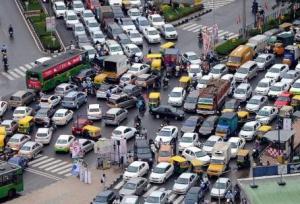A Cellular Traffic Jam For Precision Medicine In Cancer
These compensatory effects are frequently caused by proteins in the cell forming new connections in an attempt to avoid the effects of cancer drugs. In a recent paper published in Nature's Communication Biology, Joshi et al. show that cancer cells have a finite capacity for how many connections proteins in a cell can establish, and that tumors can be pushed into a state where no alternative pathways, like in a traffic jam, can be activated. Cancer cells are especially sensitive to therapy when they are forced into a position where there are no other options.
Cellular Traffic Jams Explained
As mentioned above, a good illustration to explain Joshi et al.’s findings is our road infrastructure: there are only so many roads that can be developed at any given time. When a major road is congested, automobiles can be redirected to alternative routes. Rerouting becomes impossible when alternate paths are blocked. Although no one wants to be stranded in their automobile and unable to move, this is an ideal situation for a cancer cell to use therapies. The takeaway message from cellular traffic jams for cancer treatment is that they can be induced pharmacologically, that is, with medications that are now on the market.
Despite the fact that most pancreatic cancer cells have activating defects in the KRAS gene, which leads to uncontrolled tumor cell proliferation and survival, drugs that target this genetic defect, such as Pimasertib, Trametinib, Apitolisib, and Torkinib, have failed in clinical trials in pancreatic cancer. When pancreatic tumor cells are placed into a cellular traffic jam by the medication PU-H71 (Zelavespib), however, they become sensitive to these treatments.
Joshi et al. have found that around 60% of all malignancies, regardless of origin or tumor type, are responsive to the traffic jam strategy, presenting a novel approach to cancer therapy based on cellular network features rather than genetic or epigenetic abnormalities. This shift in perspective could open the way for future therapeutic breakthroughs in cancer and non-cancerous disorders, where cellular networks, rather than specific proteins or genes, can be manipulated to increase the efficacy of existing treatments. Importantly, tumors responsive to this method can be discovered using PU-PET , an imaging scan that has already been evaluated and approved in the clinic. Individual patients could be chosen for the traffic jam treatment strategy if they test positive on the PU-PET scan, which effectively serves as a sort of personalized medicine that is becoming increasingly valuable in the clinical treatments environment.
More About Gabriela Chiosis’ Research
When most people think of cancer causes, they think of genetic mutations that cause disease. MSK is putting a lot of work towards tumor sequencing and treatment assignment based on genetic alterations in malignancies.
Gabriela Chiosis explains herself as follows: "Gene mutations, in my opinion, are simply one type of stressor that can negatively change how cells behave. A cell's function can also be influenced by a variety of different changes in its surroundings or in one’s body as they accumulate over a lifetime. These stressors change not one protein but many, adversely influencing cell behavior ". Gabriela Chiosis' approach to combating malignant cells is to understand how affected proteins interact with the other proteins – people do not exist in isolation but rather in a society. Their circle of friends and social network tells a lot about a person. Same is true for a protein in a cell. Through understanding and controlling the network of proteins in the cancer cell, she demonstrates that pre-existing drugs that were previously unsuccessful owing to resistance can now serve their intended function. Cancer cells become drug sensitive and easier to treat when they are forced into a corner with no other option. Which merely goes to prove that occasional traffic bottlenecks can really be advantageous to your health and help save lives.
When you're stuck in traffic, think about this the next time you're frustrated. At the very least, some traffic bottlenecks may be beneficial to your health.
For more information on her research, visit: https://www.mskcc.org/research/ski/labs/gabriela-chiosis
Dr. Gabriela Chiosis
The Gabriela Chiosis Lab - Sloan Kettering Institute
email us here
Legal Disclaimer:
EIN Presswire provides this news content "as is" without warranty of any kind. We do not accept any responsibility or liability for the accuracy, content, images, videos, licenses, completeness, legality, or reliability of the information contained in this article. If you have any complaints or copyright issues related to this article, kindly contact the author above.

